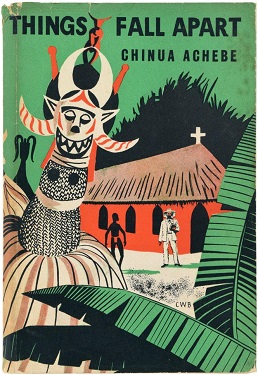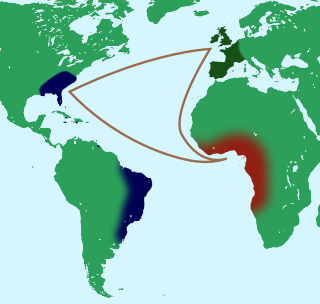Related Research Articles

Igbo is the principal native language cluster of the Igbo people, an ancient ethnicity in the Southeastern part of Nigeria.

Chinua Achebe was a Nigerian novelist, poet, and critic who is regarded as a central figure of modern African literature. His first novel and magnum opus, Things Fall Apart (1958), occupies a pivotal place in African literature and remains the most widely studied, translated, and read African novel. Along with Things Fall Apart, his No Longer at Ease (1960) and Arrow of God (1964) complete the "African Trilogy". Later novels include A Man of the People (1966) and Anthills of the Savannah (1987). In the West, Achebe is often referred to as the "father of African literature", although he vigorously rejected the characterization.

The Igbo people are an ethnic group in Nigeria. They are primarily found in Abia, Anambra, Ebonyi, Enugu, and Imo States. A sizable Igbo population is also found in Delta and Rivers States. Ethnic Igbo populations are found in Cameroon, Gabon, and Equatorial Guinea, as migrants as well as outside Africa. There has been much speculation about the origins of the Igbo people, which are largely unknown. Geographically, the Igbo homeland is divided into two unequal sections by the Niger River—an eastern and a western section. The Igbo people are one of the largest ethnic groups in Africa.

Things Fall Apart is the debut novel of Nigerian author Chinua Achebe first published in 1958. It depicts the events of pre-colonial life in Igboland and the subsequent appearance of European missionaries and colonial forces in the late 19th century. It is seen as an archetypal modern African novel in English, and one of the first novels to receive global critical acclaim. It is a staple book in schools throughout Africa and is widely studied in English-speaking countries around the world. The novel was first published in the United Kingdom in 1958 by William Heinemann Ltd and became the first work published in Heinemann's African Writers Series.

Nigerian literature may be roughly defined as the literary writing by citizens of the nation of Nigeria for Nigerian readers, addressing Nigerian issues. This encompasses writers in a number of languages, including not only English but Igbo, Urhobo, Yoruba, and in the northern part of the county Hausa and Nupe. More broadly, it includes British Nigerians, Nigerian Americans and other members of the African diaspora.

Chief Daniel Olorunfẹmi Fágúnwà MBE, popularly known as D. O. Fágúnwà, was a Nigerian author of Yorùbá heritage who pioneered the Yorùbá language novel.
Arondizuogu (Aro-ndizuogu) is a town inhabited by the Igbo subgroup of the Aro people in Imo State of Nigeria. The Arondizuogu community is believed to have migrated from Arochukwu in the present Abia State to their current settlements in Imo state, which include the Okigwe, Ideato North and Onuimo local governments. However, others of Aro descent are in other local governments in Imo State.
Eze Igwegbe Odum was an Aro Igbo politician born in the Nigerian town of Mbaukwu in present-day Awka South LGA in Anambra state. Igwegbe Odum, was not Aro by origin, but a migrant like many settlers in Arondizuogu. Along with his brothers, he fled to Arondizuogu in the late 19th century. His life story became the subject of Omenuko the earliest Igbo novel written by Pita Nwana. Odum died in 1940. He was also a brother-in-law to Ojiako Ezenne of Adazi. Igwegbe Odum never made it back to his homeland of Mbaukwu. Along with his brothers, he settled in Ndi-Aniche Uno in Arondizuogu. Their lineage include the legendary K.O. Mbadiwe and his brother Green Mbadiwe.
The Society for Promoting Igbo Language and Culture (SPILC) was founded in 1949 by Frederick Chidozie Ogbalu for the promotion of the Igbo language and culture, and has since created a standard dialect for Igbo.
Igbo people in Jamaica were trafficked by Europeans onto the island between the 18th and 19th centuries as enslaved labour on plantations. Igbo people constituted a large portion of the African population enslaved people in Jamaica. Jamaica received the largest amount of enslaved people from the biafra region than anywhere else in the diaspora during the slave trade. Some slave censuses detailed the large number of enslaved Igbo people on various plantations throughout the island on different dates throughout the 18th century. Their presence was a large part in forming Jamaican culture, Igbo cultural influence remains in language, dance, music, folklore, cuisine, religion and mannerisms. In Jamaica the Igbo were often referred to as Eboe or Ibo. There are a substantial number of Igbo language loanwords in Jamaican Patois. Igbo people mostly populated the northwestern section of the island.
Sam Uzochukwu is a Nigerian academic and expert on Igbo oral poetry.
Up to the second half of the 20th century, Tanzanian literature was primarily oral. Major oral literary forms include folktales, poems, riddles, proverbs, and songs. The majority of the oral literature in Tanzania that has been recorded is in Swahili, though each of the country's languages has its own oral tradition. The country's oral literature is currently declining because of social changes that make transmission of oral literature more difficult and because of the devaluation of oral literature that has accompanied Tanzania's development. Tanzania's written literary tradition has produced relatively few writers and works; Tanzania does not have a strong reading culture, and books are often expensive and hard to come by. Most Tanzanian literature is orally performed or written in Swahili, and a smaller number of works have been published in English. Major figures in Tanzanian modern literature include Shaaban Robert, Muhammed Said Abdulla, Aniceti Kitereza, Ebrahim Hussein, Abdulrazak Gurnah and Penina Muhando.

Flying Africans are figures of African diaspora legend who escape enslavement by a magical passage back over the ocean. Most noted in Gullah culture, they also occur in wider African-American folklore, and in that of some Afro-Caribbean peoples.
Donatus Nwoga was a poetry critic and professor of African literature at the University of Nigeria, Nsukka.

Hausa literature is any work written in the Hausa language. It includes poetry, prose, songwriting, music, and drama. Hausa literature includes folk literature, much of which has been transcribed, and provides a means of recording, preserving, and transmitting knowledge, especially in regard to social, psychological, spiritual, or political roles.

Igbo literature encompasses both oral and written works of fiction and nonfiction created by the Igbo people in the Igbo language. This literary tradition reflects the cultural heritage, history, and linguistic diversity of the Igbo community. The roots of Igbo literature trace back to ancient oral traditions that included chants, folk songs, narrative poetry, and storytelling. These oral narratives were frequently recited during rituals, childbirth ceremonies, and gatherings. Proverbs and riddles were also used to convey wisdom and entertain children.

Chief Frederick Chidozie Ogbalu (1927—1990) known predominantly as F. C. Ogbalu, was a Nigerian linguist and educator. He is predominantly known for standardizing Igbo language and is often called the "father" of Igbo language and culture. In 1949, he founded the Society for Promoting Igbo Language and Culture. Ogbalu served as the society's president for many years.
Nwosu Pita Nwana was a Nigerian novelist and carpenter. He is chiefly known as the writer of the first Igbo novel Omenuko. Nwana's Omenuko is regarded as the bedrock for fiction in Igbo literature.

Anthony Uchenna Ubesie was a Nigerian novelist, poet, playwright, broadcaster, educator, community leader, actor, and producer. He is widely known as one of the pioneers of early Igbo literature.
Udekwesiri Odilora was a Nigerian novelist and secondary school teacher. He was the author of Oka Aku Eri Eri, considered one of the foremost novels in Igbo literature.
References
- 1 2 Ricard, Alain (2004). The languages & literatures of Africa: the sands of Babel. James Currey Publishers. p. 84. ISBN 978-0-85255-581-1.
- ↑ Nwana, Pita (2004) [First published in 1933]. Omenuko. Translated by Frances W. Pritchett. Retrieved 2 September 2011.
- ↑ Campbell, George L (1998). Concise compendium of the world's languages. Routledge. p. 242. ISBN 978-0-415-16049-0.
- ↑ Obiechina, Emmanuel N (1973). An African popular literature: a study of Onitsha market pamphlets. CUP Archive. p. 15. ISBN 978-0-521-09744-4.
- ↑ Dathorne, O.R. (1975). African literature in the twentieth century. University of Minnesota Press. p. 11. ISBN 978-0-8166-0769-3.